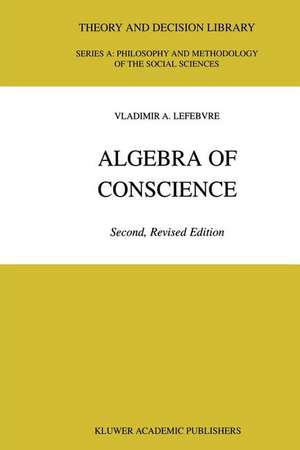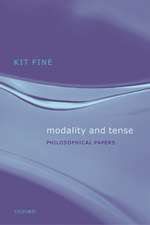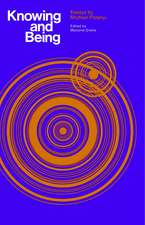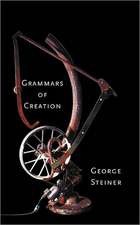Algebra of Conscience: Theory and Decision Library A:, cartea 30
Autor V. A. Lefebvreen Limba Engleză Paperback – 15 dec 2010
The new edition of The Algebra of Conscience is significantly expanded. The second part of the book, devoted to moral choice, is completely new. Based on the theory presented in the first part, it constructs the model of a subject capable of making an intentional choice. A special variable corresponds to the subject's intention. This development allows us to include within the model freedom of will and freedom of choice, and also to generalize classical 2×2 game theory to the case where outcomes, in addition to having utility measures, are either `positive' or `negative.'
In its concluding chapters the book constructs a dynamic model of the intentional subject faced with a choice between two alternatives, neither of which is morally acceptable for the subject. It is shown that in this case the probabilities of choice of the alternatives may change chaotically. From this it follows that one cannot predict which alternative will be chosen or even the probabilities with which they will be chosen.
Audience: The book is addressed to a broad readership having elementaryknowledge of mathematical logic and the theory of probability. It can be used in college courses studying the modelling of moral choice. The book's material can also be used in the design of artificial intelligence systems.
| Toate formatele și edițiile | Preț | Express |
|---|---|---|
| Paperback (2) | 383.33 lei 6-8 săpt. | |
| SPRINGER NETHERLANDS – 21 dec 2011 | 383.33 lei 6-8 săpt. | |
| SPRINGER NETHERLANDS – 15 dec 2010 | 1383.81 lei 6-8 săpt. | |
| Hardback (1) | 1390.26 lei 6-8 săpt. | |
| SPRINGER NETHERLANDS – 31 iul 2001 | 1390.26 lei 6-8 săpt. |
Din seria Theory and Decision Library A:
- 18%
 Preț: 952.40 lei
Preț: 952.40 lei -
 Preț: 382.57 lei
Preț: 382.57 lei - 18%
 Preț: 958.25 lei
Preț: 958.25 lei - 18%
 Preț: 949.23 lei
Preț: 949.23 lei - 18%
 Preț: 1232.09 lei
Preț: 1232.09 lei - 15%
 Preț: 643.34 lei
Preț: 643.34 lei - 18%
 Preț: 948.92 lei
Preț: 948.92 lei - 15%
 Preț: 581.79 lei
Preț: 581.79 lei - 15%
 Preț: 644.49 lei
Preț: 644.49 lei - 15%
 Preț: 642.83 lei
Preț: 642.83 lei -
 Preț: 389.70 lei
Preț: 389.70 lei - 18%
 Preț: 947.67 lei
Preț: 947.67 lei - 15%
 Preț: 641.20 lei
Preț: 641.20 lei -
 Preț: 388.90 lei
Preț: 388.90 lei - 15%
 Preț: 640.37 lei
Preț: 640.37 lei - 18%
 Preț: 952.26 lei
Preț: 952.26 lei - 15%
 Preț: 641.20 lei
Preț: 641.20 lei - 18%
 Preț: 953.35 lei
Preț: 953.35 lei - 18%
 Preț: 952.89 lei
Preț: 952.89 lei - 18%
 Preț: 951.47 lei
Preț: 951.47 lei - 15%
 Preț: 636.94 lei
Preț: 636.94 lei - 18%
 Preț: 944.82 lei
Preț: 944.82 lei - 15%
 Preț: 643.84 lei
Preț: 643.84 lei - 18%
 Preț: 1331.51 lei
Preț: 1331.51 lei - 20%
 Preț: 641.99 lei
Preț: 641.99 lei - 15%
 Preț: 647.40 lei
Preț: 647.40 lei
Preț: 1383.81 lei
Preț vechi: 1687.57 lei
-18% Nou
Puncte Express: 2076
Preț estimativ în valută:
264.78€ • 277.94$ • 219.78£
264.78€ • 277.94$ • 219.78£
Carte tipărită la comandă
Livrare economică 10-24 aprilie
Preluare comenzi: 021 569.72.76
Specificații
ISBN-13: 9789048157518
ISBN-10: 904815751X
Pagini: 376
Ilustrații: XIV, 358 p.
Dimensiuni: 155 x 235 x 20 mm
Greutate: 0.52 kg
Ediția:Softcover reprint of hardcover 2nd ed. 2001
Editura: SPRINGER NETHERLANDS
Colecția Springer
Seria Theory and Decision Library A:
Locul publicării:Dordrecht, Netherlands
ISBN-10: 904815751X
Pagini: 376
Ilustrații: XIV, 358 p.
Dimensiuni: 155 x 235 x 20 mm
Greutate: 0.52 kg
Ediția:Softcover reprint of hardcover 2nd ed. 2001
Editura: SPRINGER NETHERLANDS
Colecția Springer
Seria Theory and Decision Library A:
Locul publicării:Dordrecht, Netherlands
Public țintă
ResearchCuprins
Introductory Chapter.- I. Moral Cognition.- II. Ethical Systems and Boolean Algebra.- III. Boolean Algebra, Exponent, Logarithm.- IV. Individuals, Reflexion, and Interaction.- V. Automata with Semantics and Ethical Status.- VI. A Formal Representation of Doubts and Feelings.- VII. A Formal Comparison of Ethical Systems: Guilt, Condemnation, Doubt.- VIII. A Formal Comparison of Ethical Systems: Doubts and Ethical Status.- IX. Ethical Analysis of Artistic and Propagandistic Literature.- X. Experimental Analysis of Normative Individuals.- XI. The Principle of Maximization of the Ethical Status of One’s Image of Oneself.- XIIII. Feelings and Sacrifices.- XIII. Formal Connections between Modules of Inner Structures and Individuals.- XIV. Interaction. Activity and Its Measure.- XV. Ethical Typology in the Novel Crime and Punishment by Dostoevsky.- XVI. Ideology, Morality, and Political Organization.- XVII. Generalization. Proof of Existence of Ethically Non-Measurable Situations.- I. The Three-Faced Janus: An Initial Metaphor for the Model of the Subject.- II. A Boolean Model of Bipolar Choice.- III. Metachoice.- IV. Modeling of Awareness.- V. The Prisoner’s Dilemma.- VI. The Morality of Results and the Morality of Means.- VII. A Boolean-Linear Model of the Subject.- VIII. Examples of Modeling the Process of Choice.- IX. Imitation of the Other.- X. The Subject Controlling His Relationships with Another Subject.- XI. Two Aspects of Choice.- XII. Generalization of Classical Game Theory of 2×2 Zero-Sum Game.- XIII. Risk and Caution.- XIV. The Non-Linear Model of the Subject.- XV. Subject with a Quadratic Model of the Situation.- XVI. Streams of Consciousness and Difference Equations.- XVII. Streams of Consciousness and Acts of Awareness.- Appendices.- Appendix 2. EthicalSystems and Multivalued Logics.- Appendix 3. Self-Generation of Environments.- Appendix 4. A Method of Calculating Mean Ethical Statuses.- Appendix 5. Types of Adequacy of Reflexion.- Appendix 6. Schemas of Empirical Procedures.- Appendix 7. Tables.- Appendix 8. Problems of Substantiating the Initial Axioms in an Arbitrary Environment.- Appendix 9. Another Method of Representing Individuals.- Appendix 10. Representation of Completed Graphs with Polynomials.- Appendix 11. The Principle of Complementarity and the Phenomenon of Interference in the Algebraic Model of Ethical Cognition.- References.- Index of Names.




















